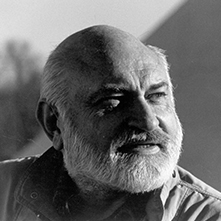What Real Health Means to Me – Dr. Hugh Riordan
 Author: Hugh Riordan, MD
Author: Hugh Riordan, MD
We seek to serve, rather than fix or help.
I want to share an insight about what we are all about. It is a concept of serving which has been delineated by Dr. Rachel Naomi Remen. She hinted at the importance of serving when she spoke at one of our conferences years ago. Since then, it has become a very important orientation that we recognize and embrace here at The Center. Since she first related the importance of serving to me, I am going to be quoting from her.
“The question, ‘How can I help?’ has become meaningful to many people, but perhaps there is a deeper question that we might consider. Perhaps the real question is not, ‘How can I help?’ but ‘How can I serve?’
“Serving is different from helping. Helpng is based on inequality. It is not a relationship between equals. When you help, you use your own strength to help those of lesser strength. If I am attentive to what is going on inside of me when I’m helping, I find that I am always helping someone who is not as strong as I am, who is needier than I am. People feel this inequality. When we help, we may inadvertently take away from people more than we ever give them. We diminish their self-esteem, their sense of worth, integrity, and wholeness.
“When I help, I am very aware of my own strength. But we don’t serve with our strength, we serve with ourselves. We draw from all of our experiences. The wholeness in us serves the wholeness in others and the wholeness in life. The wholeness in you is the same as the wholeness in me.
“Service is a relationship between equals. Helping others incurs debt. When you help someone, they ‘owe you one.’ Serving, like healing, is mutual. There is no debt. I am as served as the person I am serving.
“When I help, I have a feeling of satisfaction. When I serve, I have a feeling of gratitude. These are very different things. Serving is also different from fixing. When I fix a person [which is probably more equal to standard medicine] I perceive them as broken and their brokenness requires me to act. When I fix, I do not see the wholeness in the other person or trust the integrity of life in them. When I serve, I see and trust that wholeness. It is what I am responding to and am collaborating with.
“There is a distance between ourselves and whatever or whomever we are fixing. Fixing is a form of judgement. All judgment creates distance, a disconnection, an experience of difference. In fixing, there is an inequality of expertise that can easily become a moral distance. We cannot serve at a distance. We can only serve that to which we are profoundly connected, that which we are willing to touch.
“This is Mother Theresa’s basic message: ‘We serve life not because it is broken but because it is holy.’
“If helping is an experience of strength, fixing is an experience of mastery and expertise. Service, on the other hand, is an experience of mystery, surrender, and awe. A fixer has the illusion of being causal. A server knows that he or she is being used and has a willingness to be used in the service of something greater, something essentially unknown. [That’s one reason ever since the beginning, even though someone has a profound result, it has always been my comment that it is either because of or in spite of what we have done because life is very complicated.]
“Fixing and helping are very personal. They are particular, concrete, and specific. We fix and help many different things in our lifetime; but, when we serve, we are always serving the same thing. Everyone who has ever served through the history of time served the same thing. We are servers of wholeness and mystery in life.
“Our service serves us as well as others. That which uses us, strengthens us. Overtime, fixing and helping are draining and very depleting. Overtime, there is a tendency to burn out. Service is renewing. When we serve, our work itself will sustain us. Service rests on the basic premise that the nature of life is sacred, that life is a holy mystery which has an unknown purpose. When we serve, we know that we are part of and belong to life and to that purpose.
“Fundamentally, helping, fixing, and service are ways of seeing life. When you help, you see life as weak. When you fix, you see life as broken. When you serve, you see life as a whole.”
And that is what I think we do here in this holistic setting we call The Center for the Improvement of Human Functioning International, The Bright Spot for Health.
Hugh D. Riordan founded the Riordan Clinic (formerly known as The Center for the Improvement of Human Functioning International) in 1975. Since his passing in 2005, his spirit and mission of service has continued to be woven into the culture of the Riordan Clinic.
Dr. Remen is the author of Kitchen Table Wisdom: Stories that Heal, Riverbend Press, 1996. Quotations are from Noetic Sciences Review.
Each month we have guest authors write a column for our Health Hunters newsletter with the prompt “What Real Health Means to Me”. We’ve been blown away by the content, and the variety of answers, that they have provided. We know that Real Health is very personal and health goals vary. We hope that you find their stories inspiring and will share with your friends and family as well!
All “What Real Health Means to Me” articles
If you’d like to write an article of your own, please email us at newseditor@riordanclinic.org.





